Text

Fruiting Bodies, by Kathryn Harlan
“We all have ways of eating our lovers,” (p. 164).
———
Fruiting Bodies is a collection of stories. I haven’t read them all yet, but someone I know recommended that I read the title story, so I did. (I almost feel like I should read the whole book before I post this, but I also just want to post this because I already know the rest will do something to me, too).
Agnes and Geb live alone in their cottage in the woods. Geb is at peace with that, as a mostly solitary person who likes a simple life and only wants to nurture her wife. Agnes is a scientist, who used to take trips to town. But a few months ago her body started sprouting mushrooms (some of them poisonous, some of them not), and now she stays tucked away (she’s not so content with this). Every few days, Geb lovingly harvests the mushrooms.
An injured man appears from the woods.
———
This singular story was both anxiety inducing and soft. Its prose invoked all the tenderness and the internal emotional violence of love, and I want to eat it and then spit it back out.
———
“There are so many ways to find out what you will do when there is no one else to help you,” (p. 203).
0 notes
Text
Not sure what my motive is here, but . . .
The results will not affect which books I post about, because I actually have to want to read them, but I'm dying to know who likes to suffer!
#please i really wanna see the discourse!#book recommendations#queer books#polls#queer#literary tropes#literary fiction#fantasy books#romance books#science fiction books#historical fiction#books#queer community
212 notes
·
View notes
Text

Delilah Green Doesn't Care, by Ashley Herring Blake
LGBTQIA+ Representation: Lesbian MC with a bisexual female love interest, queer side characters
Genre: Romance
I don’t read this genre very often, but I’m a sucker for all the tropes in this book! These could be considered spoilers, but if you’re familiar with this type of plot line I’m not sure it matters.
Delilah left her small, miserable hometown straight out of high school ten years ago and moved to the big city to become a photographer. She only comes home when necessary, and sometimes not even then. She’s so close to her dream of getting an agent to represent her work, but she’s also flat broke, so when her stepsister (who she can’t stand) wants to hire her to photograph her wedding, there’s really no way she can refuse.
On her first night back in town, she runs into a group of her stepsister’s old friends, and here begins the unlikely romance – with one of her stepsister’s best friends! It’s a slow burn, with only one bed, a plot between all to get Delilah’s stepsister to break off her engagement, and some good ol’ family healing!
Overall very fun and heartwarming.
And, ya’ know, there’s some smut too.
0 notes
Text
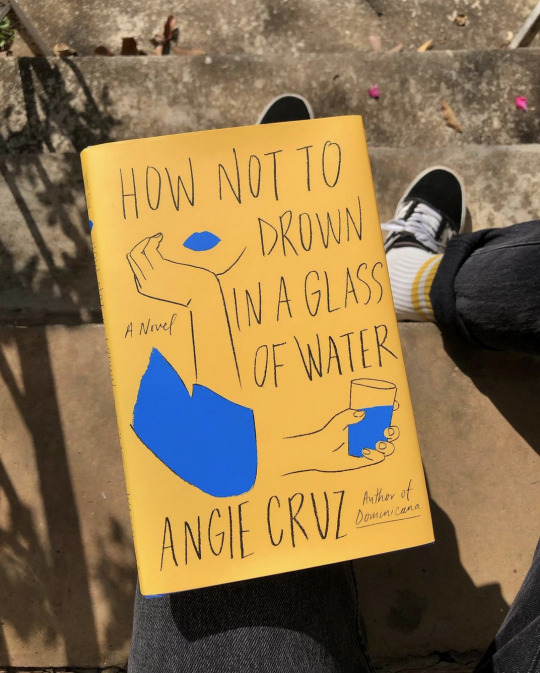
How Not to Drown In a Glass of Water, by Angie Cruz
“You never heard that word? You said you’re dominicana. You don’t understand Spanish? Oh, just a little. OK. Desahogar: to undrown, to cry until you don’t need to cry no more,” (p. 35).
—
Normally, the books I post on here are immediately recognizably queer, but that’s not the case with How Not to Drown in a Glass of Water. The main character, Cara, isn’t any type of queer, which is normally what I’m looking for, and even though she can only ever bring herself to allude to the word (or anything adjacent), queerness plays an important part in one of her most sacred relationships. For that, as well as just being a well told story in its own right, I think this book deserves recognition here.
—
The Great Recession has just begun, and after having lost her factory job of over 20 years, Cara is now struggling to pay rent. To continue to receive unemployment benefits, she must complete twelve sessions with a job counselor who slowly becomes an ear for all the things Cara seemed determined to never talk about.
She came to New York from Hato Mayor with nothing but her infant son and her own determination, desperate to escape a death she was sure awaited her. Now, her neighborhood is being gentrified, her community is slowly being dismantled, and her familial relationships are fraught with discord. To Cara, who has worked so hard to hold up everyone around her, the only thing holding her up is herself.
—
It was interesting to watch Cara’s life story unfold through her own voice, and to sympathize with her in instances where her logic was clearly flawed and her stances were not relatable. Seeing somebody’s story from the beginning, from their own point of view, I think increases our capacity for empathy and understanding (which doesn’t mean that we need to agree with their actions). Being able to hold a story in your hands and digest it at your leisure gives you the space to learn and take away your own lessons.
—
“Learn this from me: Sometimes when you can’t change your ánimo you have to have people like Hernán to remind you about the important things in life. Sometimes we need help to not drown in a glass of water,” (p. 139).
0 notes
Text

Tripping Arcadia, by Kit Mayquist
LGBTQIA+ Representation: Female MC is indicated to be bisexual or pansexual and has a female love interest, queer side characters.
Genre: Gothic Fiction
I just finished reading Tripping Arcadia, by Kit Mayquist, and if you’ve been looking forward to it but haven’t gotten around to it yet, I suggest you get started!
Tripping Arcadia is a delightfully dark tale of revenge, and the good thing about it being fiction is that I can admit to rooting for Lena’s success as she attempts to poison the man whose company terminated her father and subjected her family to financial ruin, thereby disrupting the life she had been building abroad helping her aunt reconstruct medieval gardens in Italy by forcing her to return home and become a provider.
Oh, and it turns that the man whose company ruined her family’s life is the same man she now works for as an in-house physicians assistant. A man who pays her tens of thousands of dollars extra for a specific and discrete type of help at his elite house parties. A man whose home she has unlimited access to. A man whose daughter she might be developing feelings for, and a man whose troubled and ailing son might deserve more sympathy than she originally thought.
She keeps telling herself that what she’s doing is for her family, and for all the people like them, but it is clear that her desire for revenge is also rooted in the need to regain a sense of agency.
This book is truly delicious in the way it makes the desire for power and revenge relatable, and the methods justifiable.
1 note
·
View note
Text
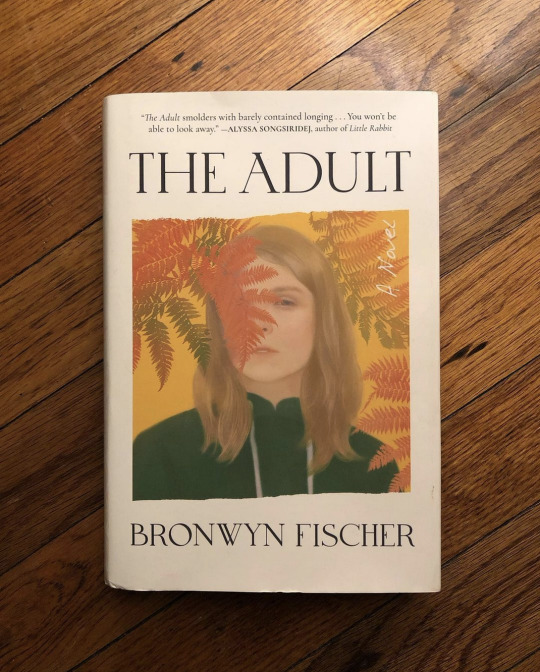
The Adult, by Bronwyn Fischer
“And the warmth that spread against my chest felt so hot that I looked down to make sure it was just inside,” (p. 71).
———
New favorite book alert 🚨 (Do you hate it when people use emojis like that?)
Natalie is eighteen, entering university in Toronto, coming straight from some place you’ve never heard of. She’s alone and learning how to be an adult in an environment so unlike the one she grew up in, and as a lot of us know, there is often nothing more lonely than the experience of becoming.
Nora is an older woman. They meet in the park. She’s everything that Natalie seems to be missing, and for some reason, Nora finds something in Natalie, too.
Natalie falls fast and hard, the way you do the first time; it’s all-consuming, feeding her and eating her from the inside out. She’s burning up.
And of course, there’s something . . . off about Nora. She has a pocket full of secrets.
———
Reading The Adult was heartbreaking in a way that makes you yearn for it over and over again. It’s poetic not only in prose, but in its emotional evocation. It’s a story that I had to take in slowly - not because it was bad, but because it was real and I wanted to shove it in my mouth. Natalie’s love is the morning sun on the kitchen windowsill; it was the winter chill cutting through your jeans.
And the whole time, you know exactly what is up with Nora. You’ve got it figured out almost from the beginning. But Natalie doesn’t know, and all you can do is trail behind her, waiting for her to fall.
———
“In the dark, when I’m back in my room, I see Nora by the window. She has collected where the blinds let in light,” (p. 298).
5 notes
·
View notes
Text
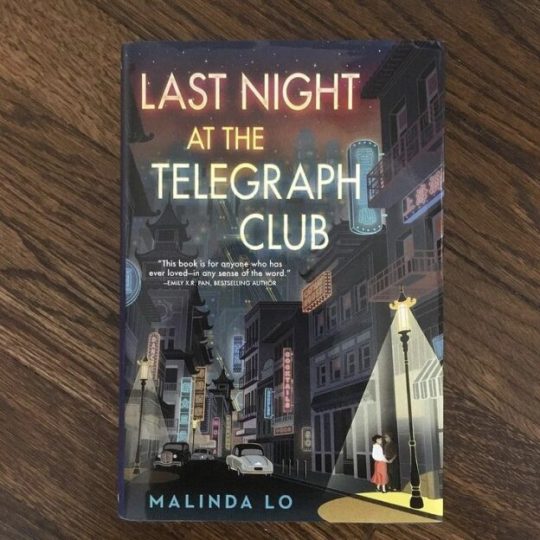
Last Night at the Telegraph Club, by Malinda Lo
LGBTQIA+ Representation: Lesbian MC, a ton of other sapphic side/background characters
Genre: YA Historical Fiction
Last Night at the Telegraph Club is a wonderfully researched novel that gives a strong insight into Chinese American culture in 1950’s San Francisco, as well as what it meant to be a lesbian at that time.
The book is about Lily, a Chinese American girl coming of age in San Francisco’s Chinatown in the mid 1950’s, who is starting to understand why she notices every woman wearing men’s clothing, or why she can’t stop paying attention to the subtle ways that some women are affectionate towards each other in ways they normally are affectionate towards men (the brush of fingers, the closeness of their shoulders as they walk). It was heart wrenching, but also so full of hope.
The author, Malinda Lo, was born in China but has lived in the U.S. from a young age, and she is married to a woman! At the end of the book, she has included comments on the research she did to make sure what she wrote was as accurate as possible, and there are some cool resources listed that I might check out sometime.
Reading this book took me back through pieces of what it felt like to realize that I like women, and the feelings of secrecy that once surrounded it. Living life as a gay adult is so different than living as a gay teenager, and it was nice and also really sad to revisit some of those particular struggles. A lot happened in the book that I can’t relate to, because of the time period it’s set in and because I’m a white American, but I felt really connected to it.
#queer books#sapphic books#lesbian books#historical fiction#ya fiction#chinese american representation
2 notes
·
View notes
Text

The Chosen and the Beautiful, by Nghi Vo
“Who had time for the future in a summer like that one?”
LGBTQIA+ Representation: Pansexual MC,
Genre: Historical Fiction/Magical Realism
You know how we all wanted a queer retelling of The Great Gatsby? This is it (but it’s also something different)!
The Chosen and the Beautiful is told from the perspective of Jordan Baker (a side character in the original Gatsby novel) – a girl who was “adopted” from Vietnam as a baby and brought up in wealthy 1920’s American society. This is a world of magical realism, where Hell exists and lions are brought to life from paper, and where everyone seems to want a little bit of everyone.
Jordan is a woman who seems to accept herself fully, but who also struggles with her cultural identity. She is as American as anyone around her, but as she grows and becomes more and more of a full person, it becomes harder and harder to deny that something might be missing – that something might have been taken from her. The people around her “don’t mean her” with their casual racism, and the magic she has is as foreign to her as Vietnam.
#nonmonogamy#pansexual representation#magical realism#historical fiction#lgbtqia#the chosen and the beautiful
3 notes
·
View notes
Text
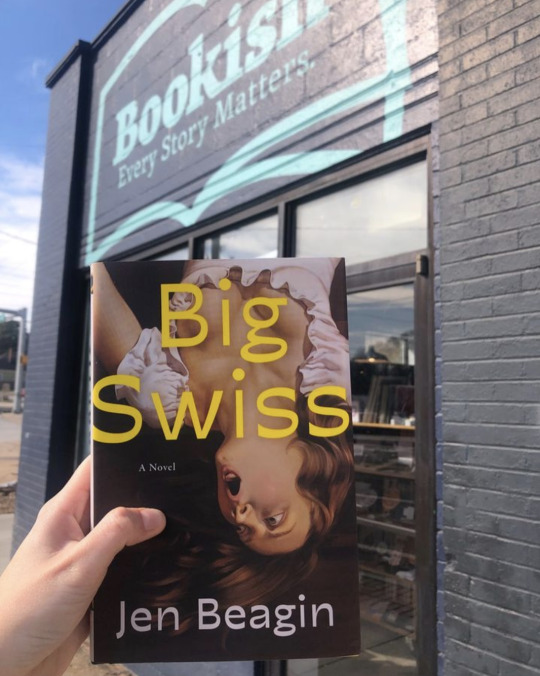
Big Swiss, by Jen Beagin
“Greta blinked and rolled onto her back. It dawned on her slowly, a little painfully, that what she’d been looking for inside the dream house, and what she’d found, was her own appetite. She’d been famished all these years without knowing it,” (pg. 174).
In short, this is a book about a woman (Greta) who transcribes therapy sessions for her small town’s local sex therapist, and who becomes obsessed with one of the patients (Big Swiss, AKA Flavia). Greta doesn’t know what Big Swiss looks like, or even her real name, but she has a version of Big Swiss in her head, and she likes to listen to her voice like a podcast. When they cross paths at the dog park and Greta recognizes Big Swiss’s voice, she starts to spin a web of self-preserving lies just so she can hang on a little longer.
***
There’s something feral about the way this book is written, and it wouldn’t work any other way. It’s honest, and it’s FUNNY, and a little bit absurd. It’s just Big Swiss and Greta and Big Swiss and Greta and Big Swiss and Greta and Greta’s mother’s suicide note. It’s tens of thousands of bees in the kitchen, and just deciding to live with that.
I really don’t know what to say, other than that this is my new favorite book, because there’s something refreshingly real about it. I’d read it again and again and again and again.
5 notes
·
View notes
Text

Barbalian, Red Planet, from Dark Horse Comics
Writers: Jeff Lemire, Tate Brombal
Artist: Gabriel Hernandez Walta
Colorist: Jordie Bellaire
Lettering: Aditya Bidikar
Number of Issues: Five (5)
Synopsis: It’s 1986, in the midst of the AIDS pandemic, and Barbalien, a.k.a. Mark Markz, has been sent to Earth from Mars to do reconnaissance. He’s only supposed to gather information before reporting back, but finds himself staying longer than intended, and is branded a traitor to his kind. Having taken on a human form and having become a cop in an attempt to better protect humanity in any way he can, Mark soon finds himself unintentionally embedded with the queer community and their fight for justice. He struggles with reconciling what he thought it meant to be a police officer, and the realities of the harm his fellow officers inflict on the people he has come to love and identify with.
Thoughts: This is a story about self acceptance, prejudice, critical thought, and the ability to make a choice about your life. It is also a reminder of the fight and sacrifices that those who came before us had to make in order for us to be able to enjoy what rights we have today. For some of us, like myself, the road has been pretty smooth, but for many of us it continues to be a challenge. There’s still a lot of work to be done (because no, the legalization of same sex marriage was NOT our last fight even though that’s sometimes what it feels like). The Barbalien story is rooted in tragedy, but it is also quite inspirational.
CW for Barbalien: Homophobic slurs, both implied and visual violence against the queer community.
0 notes
Text

Disobedience, by Naomi Alderman
I’ll be honest - I think the reason I put off posting about this book for so long, despite the fact that I finished it months ago, is because I can’t stand the screen cap they used from the movie as the cover. Why are their eyes half open?! Also, sorry in advance, but this post is also a bit of a personal tangent 💫
If you’ve seen the movie, you’ll most likely go into this with certain expectations (I’m looking at you, Spit Scene™️), but as tradition dictates, the movie versions of books are generally a bit different. The main premise was the same across both mediums, but major things such as Ronit’s profession, the portrayal of her feelings towards Esti (and in contrast, Esti’s feelings towards her), and even the ending all told a slightly different story. Nevertheless, I think the movie adaptation remained true to the message of the book: we each have the ability to make choices, and sometimes we have to make choices between parts of ourselves that are equally integral to who we are.
Disobedience is an insightful look at the intersection between religion and sexuality, and I think the time during which this book was set and published (early 2000s) only serves to highlight that relationship more intensely. Personally, I love reading about queer relationships and experiences set pre 2010, because I think it speaks to a part of me that had experiences that don’t exist in quite the same way today.
I’m sure almost all of you can relate to The Decision™️ (you know the one about coming out that you have to make every single time you meet a new person). Today, I can walk into most rooms and it’s almost a guarantee that I’ll have at least one supporter. But still, I have to decide: is this a safe space for me? Who here can I talk to? Who here will understand? And if they are like me, will our experiences be similar enough to feel like we belong to the same community? Will we understand each other’s choices? Do these people remember what it was like to have the word “gay” thrown around as an insult between classmates? Do they remember what a strange and humanizing (isn’t that messed up?) relief it was to suddenly be allowed to get married?
Anyways, good book!! 📚
#queer books#lgbtq books#lesbian books#lesbian representation#bisexual representation#realistic fiction
1 note
·
View note
Text
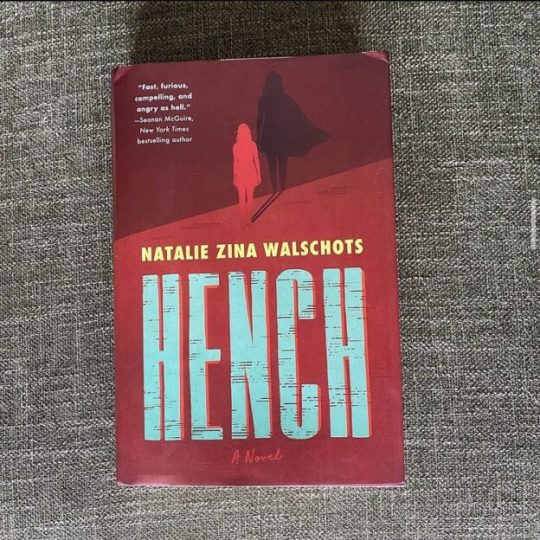
Hench, by Natalie Zina Walschots
LGBTQIA+ Representation: Bisexual/pansexual (not directly specified) protagonist, non-binary side character, MTF side character, gay male side character.
Genre: Science Fiction (though it’s really more of a “superhero” story).
Thoughts: Everyone loves a good hero story, but I think it’s safe to say that a large group of people are also drawn to the villains, and that’s exactly who this book is for! Often, what makes a villain so intriguing is the pieces of ourselves that we are able to see in them. Despite their struggles and their flaws, they, like us, are human. Hench, by Natalie Zina Walschots, emphasized this by bringing heroes and villains to the same level. A villain might be willing to sacrifice others to get what they want, but at least they aren’t pretending what they’re doing is something that it’s not; a hero might sacrifice others for the “greater good” and their ego. At the heart of it, they’re pretty much the same.
Cool superpowers, evil lairs, a cyborg here and there, revenge plots, friendships left behind, fancy getaway cars and traditional supervillain ray guns, and working through mental trauma are all included!
For me, author did a really good job making most of the important characters easy to understand and empathize with, which I really enjoyed. The struggles that the characters experienced in the workplace (crappy bosses, job insecurity, low wages, etc.) before turning into the “bad guys” were all too familiar, and if henching for villains was a real thing, I could definitely see the appeal. A lot of this book just made a lot of sense.
#bisexual representation#pansexual representation#nonbinary representation#gay representation#queer books#lgbtq books#science fiction books#science fiction
1 note
·
View note